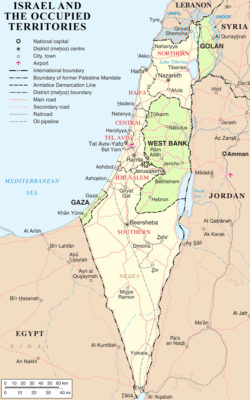
A Boston University history course on the Israeli-Palestinian conflict — which has previously only been taught during fall semesters — has been added to the spring 2018 registrar after sophomore Maddy Werner successfully petitioned the history department to offer the class in the spring.
The history course — HI 393 — has never been offered during the spring semester because the class’s professor, Nahum Karlinsky, spends his springs teaching the course in Israel at the Hebrew University of Jerusalem, according to Werner.
In order to get the class on the spring registrar, Michael Zank, a religion professor and director of the Elie Wiesel Center for Jewish Studies, said he recommended to Werner that she find a way to demonstrate sufficient student interest in the course.
“I suggested that if she could get a group of students together who could commit to taking the course in the spring, and if she could get the History department’s approval to run the course a second time this year, we would make every effort to find suitable faculty and funding to run the course in the spring,” Zank wrote in an email.
In order to gauge students’ interest in the course, Werner posted polls on the official Boston University freshman, sophomore and junior class Facebook pages where students could vote on the likelihood they would take the course in the spring. She said she received the largest response from the Class of 2020 Facebook page.
Werner said she then brought the results of the poll to Zank, who determined there was enough support to begin organizing the class for the spring semester and secured the approval of the history department.
The department was then able to “identify a qualified scholar to teach it,” Zank wrote. Walker Robins, who is currently a post-doctoral fellow in Israel Studies at Brandeis University, will teach the course in the spring, Zank added.
Werner said she petitioned the department not only because her schedule didn’t allow for her to take the class in the fall, but also because she wanted BU students to learn more on the Israeli-Palestinian conflict and generate more conversation about the topic on campus.
“So many students just aren’t informed of basic knowledge about the Israeli-Palestinian conflict,” Werner said. “You can’t advocate for … something that people are not aware of. We were hoping that more students would be able to actually have a conversation on campus about that issue.”
Nancy Ammerman, associate dean of the faculty for the social sciences in the College of Arts and Sciences, said such a late addition of a course to the spring registrar is uncommon.
“Because there are so many variables in the scheduling of courses, it would often not be possible to make this kind of addition at the last minute, especially when a course has been being regularly offered,” Ammerman wrote in an email. “We are fortunate that everything came together to make this possible.”
Ammerman also wrote that students’ ideas or suggestions are “important in the planning process, but they are best sent directly to the department at an early stage.”
Several BU students who expressed interest in the course through the Facebook polls said they think students should have a role in deciding what classes are taught at the university.
Martin Weissgerber, a CAS junior, said he was interested in the course because his family is close to the issue.
“I was initially interested in taking this course because I’ve been exposed to the Israeli-Palestinian conflict for some time now, due to my parents and research I did myself,” Weissberger said.
Weissberger also said he thinks “it is really important for students to engage with the university with regards to the courses they take.”
Sofia Moffat, a CAS sophomore who is minoring in history, said she wanted to take the course because she wanted to learn about the conflict between Israel and Palestine.
“Even though it is constantly on the news, I don’t really know anything about the topic,” Moffat said. “Universities should allow students to expand their knowledge of the world.”
Yaseen Moukara, a sophomore in the College of General Studies, said he has not yet decided if he will take the course, but voted in the Facebook poll because he has “very close friends who are directly affected by the information related to this course,” Moukara said.
Moukara also said he thinks it is very important for students to engage with the university.
“I feel like many courses or organizations within the college would not exist without student involvement,” he said.























































































































